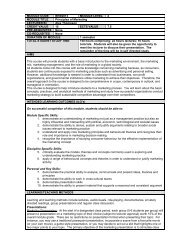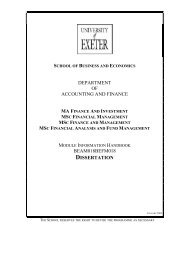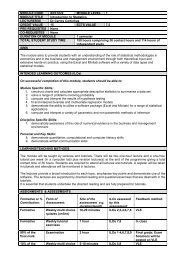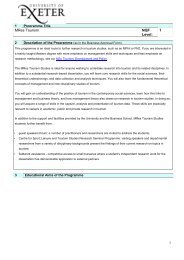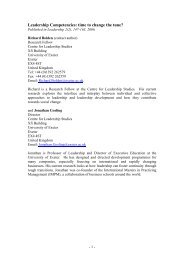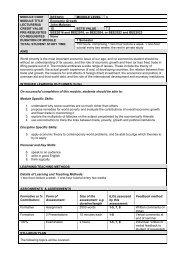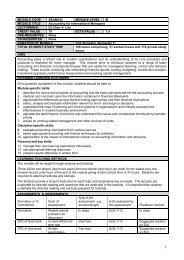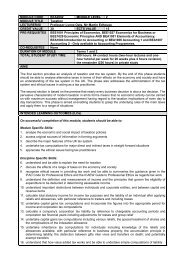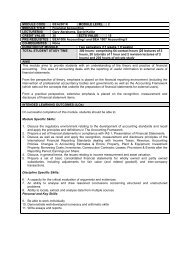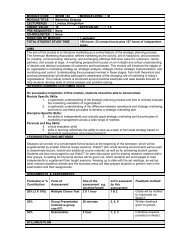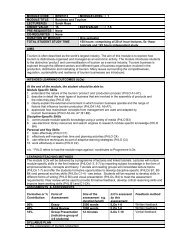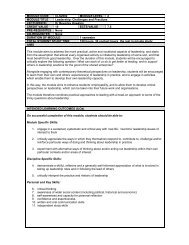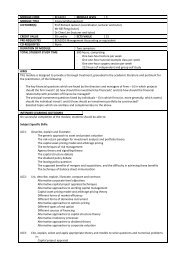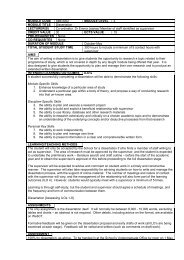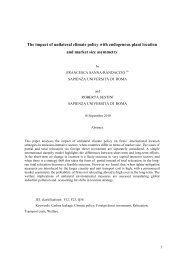What is Leadership? - The Business School - University of Exeter
What is Leadership? - The Business School - University of Exeter
What is Leadership? - The Business School - University of Exeter
You also want an ePaper? Increase the reach of your titles
YUMPU automatically turns print PDFs into web optimized ePapers that Google loves.
limited, but does generally support a<br />
positive causal relation.<br />
Two studies that have identified direct<br />
financial benefits <strong>of</strong> investing in MLD<br />
include a study by Lee et al. (1993) who<br />
estimated Brit<strong>is</strong>h Telecom to have saved<br />
£270 million as the result <strong>of</strong> a<br />
management-training programme (due<br />
to the reduction in errors by untrained<br />
junior managers and waste caused by<br />
m<strong>is</strong>sed deadlines, customer complaints,<br />
etc.). And DTZ (1998) who found that<br />
63% <strong>of</strong> firms involved in management<br />
development activity (supported by the<br />
Training and Enterpr<strong>is</strong>e Council) could<br />
identify an impact <strong>of</strong> th<strong>is</strong> on business<br />
performance - primarily via improved<br />
staff morale, improved response and<br />
flexibility and improvements in quality<br />
which in turn, they believe, lead to<br />
greater customer loyalty and new<br />
business.<br />
Mabey and Thompson (2000) found that<br />
positive outcomes <strong>of</strong> management<br />
development investment could largely be<br />
attributed to the manner in which an<br />
organ<strong>is</strong>ation made its policy choices,<br />
with particular importance being given to<br />
the company’s commitment to training<br />
activity. Marshall et al. (1993) found a<br />
clear relationship between the use <strong>of</strong><br />
external consultants in management<br />
development in SMEs and business<br />
performance, and in a study <strong>of</strong><br />
leadership in UK organ<strong>is</strong>ations Horne and<br />
Stedman Jones (2001) concluded that<br />
where systematic implementation <strong>of</strong><br />
leadership development ex<strong>is</strong>ted there<br />
was a strong relationship to the<br />
perceived quality <strong>of</strong> leadership in that<br />
organ<strong>is</strong>ation and organ<strong>is</strong>ational<br />
performance. Mabey and Ramirez<br />
(2004) reached similar conclusions in a<br />
recent international study as indicated<br />
below:<br />
“<strong>The</strong>re <strong>is</strong> strong stat<strong>is</strong>tical evidence<br />
that management development leads<br />
to superior organ<strong>is</strong>ational<br />
performance across companies <strong>of</strong> all<br />
sizes, sectors and national location.<br />
An impressive 16 per cent <strong>of</strong> variance<br />
<strong>is</strong> explained by three factors: the<br />
extent to which HR <strong>is</strong> integrated with<br />
business strategy, the degree to<br />
which the firm takes a thoughtful,<br />
long-term approach to developing<br />
managerial capability and the belief<br />
by line managers that their employer<br />
<strong>is</strong> taking management development<br />
seriously.” (Mabey and Ramirez,<br />
2004, p9).<br />
In addition to th<strong>is</strong> selection <strong>of</strong> studies,<br />
there are a large number that indicate a<br />
link between HRM practices and<br />
organ<strong>is</strong>ational performance as well as<br />
the impact <strong>of</strong> training more generally.<br />
In a synthes<strong>is</strong> <strong>of</strong> research on HRM<br />
practices, for example, Becker and<br />
Huselid (1998) identified “management<br />
development and training activities<br />
linked to the needs <strong>of</strong> the business” as<br />
one <strong>of</strong> four key HRM systems. Additional<br />
work on the benefits <strong>of</strong> HRM emphas<strong>is</strong>es<br />
how managers need to implement<br />
practices through their own personal<br />
skills (e.g. empowerment, team working,<br />
and performance management) and, as<br />
concluded recently by Purcell et al.<br />
(2003), it <strong>is</strong> the quality <strong>of</strong><br />
implementation that really affects the<br />
success <strong>of</strong> an intervention more than the<br />
nature <strong>of</strong> the initiative itself.<br />
In a longitudinal study <strong>of</strong> over 100 UK<br />
manufacturing companies Patterson et<br />
al. (1997) found that 18% <strong>of</strong> variations<br />
in productivity and 19% in pr<strong>of</strong>itability<br />
could be attributed to people<br />
management practices. Research <strong>is</strong><br />
increasingly indicating that HRM<br />
initiatives are more likely to be effective<br />
where they ‘fit’ with other HR and<br />
business strategies within the<br />
organ<strong>is</strong>ation and that the key to th<strong>is</strong> lies<br />
in successful management and<br />
leadership (see Richardson and<br />
Thompson, 1999 for an excellent review<br />
<strong>of</strong> th<strong>is</strong> literature).<br />
Although findings are complex and it <strong>is</strong><br />
hard to quantify in any cons<strong>is</strong>tent way<br />
the link between MLD, capability and<br />
performance it <strong>is</strong> now fairly well<br />
accepted that management and<br />
leadership are critical factors in the<br />
effective implementation <strong>of</strong> HRM and<br />
business strategies that, in turn, affect<br />
organ<strong>is</strong>ational performance.<br />
<strong>The</strong> relationship between MLC<br />
and national performance<br />
For a number <strong>of</strong> years the UK<br />
government has believed that effective<br />
22 www.leadershipsouthwest.com



